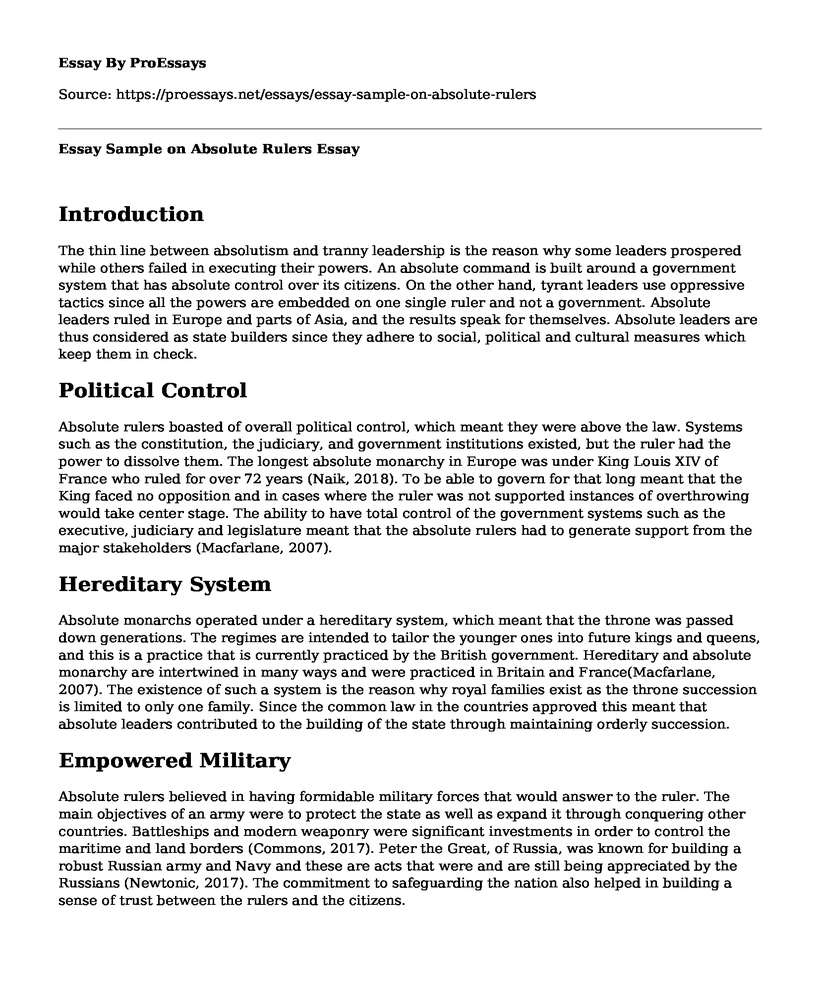Introduction
The thin line between absolutism and tranny leadership is the reason why some leaders prospered while others failed in executing their powers. An absolute command is built around a government system that has absolute control over its citizens. On the other hand, tyrant leaders use oppressive tactics since all the powers are embedded on one single ruler and not a government. Absolute leaders ruled in Europe and parts of Asia, and the results speak for themselves. Absolute leaders are thus considered as state builders since they adhere to social, political and cultural measures which keep them in check.
Political Control
Absolute rulers boasted of overall political control, which meant they were above the law. Systems such as the constitution, the judiciary, and government institutions existed, but the ruler had the power to dissolve them. The longest absolute monarchy in Europe was under King Louis XIV of France who ruled for over 72 years (Naik, 2018). To be able to govern for that long meant that the King faced no opposition and in cases where the ruler was not supported instances of overthrowing would take center stage. The ability to have total control of the government systems such as the executive, judiciary and legislature meant that the absolute rulers had to generate support from the major stakeholders (Macfarlane, 2007).
Hereditary System
Absolute monarchs operated under a hereditary system, which meant that the throne was passed down generations. The regimes are intended to tailor the younger ones into future kings and queens, and this is a practice that is currently practiced by the British government. Hereditary and absolute monarchy are intertwined in many ways and were practiced in Britain and France(Macfarlane, 2007). The existence of such a system is the reason why royal families exist as the throne succession is limited to only one family. Since the common law in the countries approved this meant that absolute leaders contributed to the building of the state through maintaining orderly succession.
Empowered Military
Absolute rulers believed in having formidable military forces that would answer to the ruler. The main objectives of an army were to protect the state as well as expand it through conquering other countries. Battleships and modern weaponry were significant investments in order to control the maritime and land borders (Commons, 2017). Peter the Great, of Russia, was known for building a robust Russian army and Navy and these are acts that were and are still being appreciated by the Russians (Newtonic, 2017). The commitment to safeguarding the nation also helped in building a sense of trust between the rulers and the citizens.
Influence Over the Clergy
Throughout the history of any form of leadership, being in good books with the churches helps in winning the confidence of the public. Religious bodies have proved to be stronger at some point, and absolute leaders rely on their support in many ways. Absolute leaders influenced religious systems and would choose to work with one that is preferred by the people. The Vatican City is an excellent example of an absolute monarchy which is headed by the pope. The only form of religion in Vatican City is Roman Catholicism an absolute-elective system works when choosing the next leader (Klein, 2013). The Pope is an excellent example of an absolute ruler who has been able to build an empire that has been growing steadily for years.
Conclusion
Absolute leadership still exists although mostly in the Arab world with Saudi Arabia being the most popular absolute monarchy. The Pope remains the only absolute ruler in Europe today as many absolute monarchs adopted constitutional monarchs. Absolute rulers were appreciated since in building their empires they positively influenced the life of the citizens. Absolute rulers built strong armies, encouraged trade, fostered social equality and harmonized religion groups. Absolute rulers, as opposed to tyrants, are considered as state builders who have helped in social, political and economic transitions.
References
Commons, C. (2017). Absolute Rulers of Russia - CDA's World History Wiki. Retrieved from http://cdaworldhistory.wikidot.com/absolute-rulers-of-russia
Klein, C. (2013). 10 Things You May Not Know About the Vatican. Retrieved from https://www.history.com/news/10-things-you-may-not-know-about-the-vatican
Macfarlane, L. (2007). Absolutism, Tyranny and the Minimum Conditions of Constitutional Rule. Government And Opposition, 12(02), 212-233. doi: 10.1111/j.1477-7053.1977.tb00532.x
Naik, A. (2018). The Characteristics and Examples of an Absolute Monarchy. Retrieved from https://historyplex.com/characteristics-examples-of-absolute-monarchy
Newtonic, L. (2017). 10 Major Accomplishments of Peter the Great | Learnodo Newtonic. Retrieved from https://learnodo-newtonic.com/peter-the-great-accomplishments
Cite this page
Essay Sample on Absolute Rulers. (2022, Nov 22). Retrieved from https://proessays.net/essays/essay-sample-on-absolute-rulers
If you are the original author of this essay and no longer wish to have it published on the ProEssays website, please click below to request its removal:
- Diversity Democracy Dissent Essay Example
- How to Solve the Welfare Cliff Paper Example
- Essay Sample on Liberalism: Protecting People's Interests in Politics
- U.S Constitution: Origins, Roles & Duties - Essay Sample
- Essay Sample on Democracy for America: Uniting to Fight Populism & Elect the New Majority
- Essay on Trump's Chaotic Response to COVID-19: Narcissistic Psychopath or Misjudgment?
- US Government Reforms to Affordable Healthcare Act - Free Essay Sample







